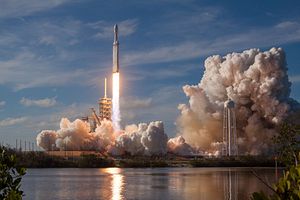On Tuesday, in its first test flight, Elon Musk’s SpaceX successfully launched Falcon Heavy — one of the world’s most powerful rockets — from the Kennedy Space Center at Cape Canaveral in Florida.
Along with millions around the world, Chinese people were deeply impressed by SpaceX’s victorious launch, particularly the company’s breathtaking reusable launch system.
Soon after two of Falcon Heavy’s booster rockets landed safely on the launch pad, news reports with photos and video footage swept Tencent Wechat and Sina Weibo — two of China’s most important social media platforms. Thousands of Chinese netizens reposted the information on their own social media accounts and applauded Musk’s great achievement.
However, China’s national media expressed mixed feelings about Musk’s Falcon Heavy rocket.
For example, Global Times, one of China’s most nationalistic state-run newspapers, issued a series of articles on both its website and its social media account, introducing the launch in detail.
On the one hand, Global Times highly complimented SpaceX’s advanced technology, used in the latest launch, saying that the Falcon Heavy rocket has “totally crushed all other current rockets in the world.”
On the other hand, Global Times couldn’t help but attribute Musk’s feat to the United States as a whole and compare China’s space technology with that of the United States.
One of many Global Times’ articles on SpaceX wrote emotionally:
What really shocks us Chinese is not only that our country currently doesn’t have rockets of such magnitude, but the fact that we are almost 10 years behind; more importantly, what our country has to desperately catch up with is actually a private U.S. enterprise…
To put it more bluntly, this time the Americans showed us Chinese with pure power that why they are still the strongest country in the world and how wide the gap really is between us and them …
On February 7, Global Times even published an editorial in Chinese under the title of “The road for China to catch up with the United States on science and technology is still very very long.” Taking a rare tone, the editorial admitted China’s backwardness on technology and, at the same time, directly criticized some rising perceptions that “China has generally surpassed the United States as a whole.” However, the editorial didn’t forget to vow that China will take steps to improve its space technology.
Interestingly, the newspaper hasn’t translated this fairly balanced editorial (compared to its many other strongly worded editorials) into English so far.
China’s national TV station, CCTV, showed another interesting tendency in reporting the launch. CCTV focused most of its attention on the fact that the third booster of Falcon Heavy rocket failed to land on its launching pad on the sea, not the overall success of the launch.
While nationalism is deeply embedded in China’s national media reports, many Chinese citizens, impressed by Musk’s feat, reflected upon China’s problems from a totally different angle.
For example, one comment by an unknown Chinese netizen has been widely reposted. It reads:
The real difference [between China and the United States] is that Americans put this line “Made on Earth by humans” on Tesla’s engine … rather than “made in America.” The Tesla plays on loop “Space Oddity,” created by great British artist David Bowie in the 1970s, rather than the American national anthem. Inside the car lay a copy of The Hitchhiker’s Guide to the Galaxy, known as the science fiction bible written by British writer Douglas Adams… What truly makes miracles come true is mankind’s spirit of exploration and adventure… rather than so-called national pride.

































